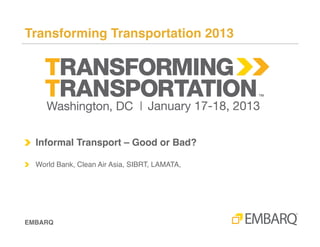
Informal Public Transport - Good or Bad? - Introduction slides - Transforming Transportation 2013 - EMBARQ and The World Bank
- 1. Informal Public Transport: Good or Bad? Introduction! ! Presented at Transforming Transportation 2013! ! Multiple speakers! ! This presentation is an introduction to the debate on Information Transport! Transforming Transportation 2013!
- 2. “Service” Lebanon, Jordan, “Cars Rapide” Israel, Pales?ne Senegal “Micro” Peru “TroTro” “Danfo” Ghana Nigeria Informal Public Transport Good or Bad?? “Combi” South Africa “Jeepney” the Philippines “Dolmus” Turkey “Tempo” India “Bemo” Indonesia
- 3. Informal Public Transport • A mode of transport prevalent in developing countries where private sector entrepreneurs operate small passenger vehicles on a route with no schedules and no formal stops; • The services – operate when the entrepreneurs choose – begin their runs at terminals which they generally leave when they are either full or close – stop to pick up and drop off passengers anywhere along the way to a terminal at the other end of the route – may divert off the given route; • Regula=on – Entry? – Fare? – Safety?
- 4. Formal Public Transport • A mode of public transport that u=lizes rela=vely larger vehicles that operate on a fixed route, with a fixed schedule serving only designated stops and terminals • Formal public transport is strongly regulated with respect to operator entry, bus standards, fares, span of service and schedules, stops and terminals and labor prac=ces • Services may either be provided by a state owned enterprise or by the private sector on the basis of compe==vely procured contracts or concession agreements
- 7. The Debate 1. Informal public transport should be leI alone, with minimal regula=on -‐-‐ the number of vehicles plying, vehicle safety and condi=on and driver skills; Or 2. Informal public transport should be eliminated in favor of more highly regulated, formal public transport.
- 8. Manila
- 10. Transforming Transportation 2013! ! Co-organized by EMBARQ and The World Bank! ! More information at:! ! EMBARQ.org! ! worldbank.org/transport! ! Questions? Comments? Contact us at embarq@wri.org! ! Follow us on Twitter: @EMBARQnetwork! Transforming Transportation 2013!
